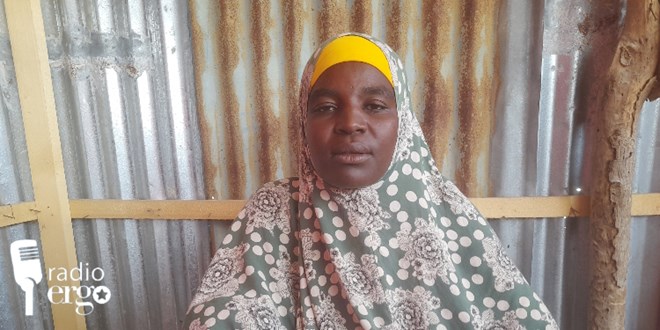
Tuesday February 27, 2024

Mother of nine and farmer, Habibo, finds shelter in a communal hall in her IDP camp in Mogadishu/Rijaal Abdi/Ergo
Internal displacement camps in Mogadishu have been swelling with families who lost their farms and source of living in areas along the river Shabelle during flooding late last year.
Habibo Abdi Kuus, a single mother of nine, moved to Biyo iyo Nafta camp in Mogadishu’s Kahda district Habibo after her farm in Dhista village, Lower Shabelle, was ruined last December.
They sought refuge in the city hoping to find food and shelter, but she has been disappointed and can’t even find any work to make ends meet.
“We don’t have shelter, we don’t have water, or toilets. We have nothing. This is our situation. We have to sit outside all day in scorching sunlight. All we can do is seek help from the people who are better off,” Habibo said.
“We used to get water at home from the catchment areas, but here everything has a price tag. If we get a little food, we need to find money for firewood and water as well. We need money to get all these things, but we don’t have any!”
Habibo, whose husband left her without any support, is worried that her four children who were in a free primary school and younger four who were having free Koranic lessons are now out of education.
The children go out doing shoe-shining jobs and bring back around 20,000 Somali shillings to help their mother.
“We are now living with people in worse conditions than us. We can’t return to our home because our farms are still flooded, and there is no food or livestock there. We have lost our farm and this is the situation in Mogadishu,” she complained.
The floods hit after two years of failed rains in their area. Habibo had taken a loan of $550 to plant maize, sorghum and vegetables on her one-hectare farm, all of which were ruined.
According to IDP camp leaders, 1,100 families joined different camps in Kahda between last December and this January, mostly from Lower and Middle Shabelle region.
Ali Warsame, 70, is trying to raise his six grandchildren in Darmale camp in Kahda district, where they arrived two months ago. He said they are in the worst position they have ever experienced since he started farming 30 years ago.
His farm in Wanlaweyn, Lower Shabelle, was submerged and he lost his $1,000 investment and his 60 goats that drowned.
He has been begging in the mosques around the camp trying to feed the children one meal a day.
“I am just confused here, the children don’t have jobs, the women don’t have jobs. We are facing a dire situation,” he said.
Ali estimates around 60 other families were displaced from his village. He says they only occasionally get water and small food handouts in the camp.
“There is barely any food in the camp. We used to be able to eat whatever we grew on our farm even if the drought lasted for five years. We are living in a shack now, we have nothing, I don’t know how to make a living for the children,” this grandfather said.
Qalib Abdullahi and his family of eight children have been living in Darmale camp since losing their sesame, maize and beans to the floods in Dafeed village, Lower Shabelle.
It’s the first time they have ever been displaced and like others they came to Mogadishu because there were some families they know in the camp or the city.
“We don’t have anything, we are becoming vulnerable, we have nothing. We’ve left our home and we don’t have anything in this place, God only knows about our shelter, we have no shelter at the moment,” he declared.
He lost $800 invested in his four-hectare farm that he had been hoping to harvest in February. Despite going out to find work in the morning he’s been returning to Darmale camp tired but without any job or money in the evening.